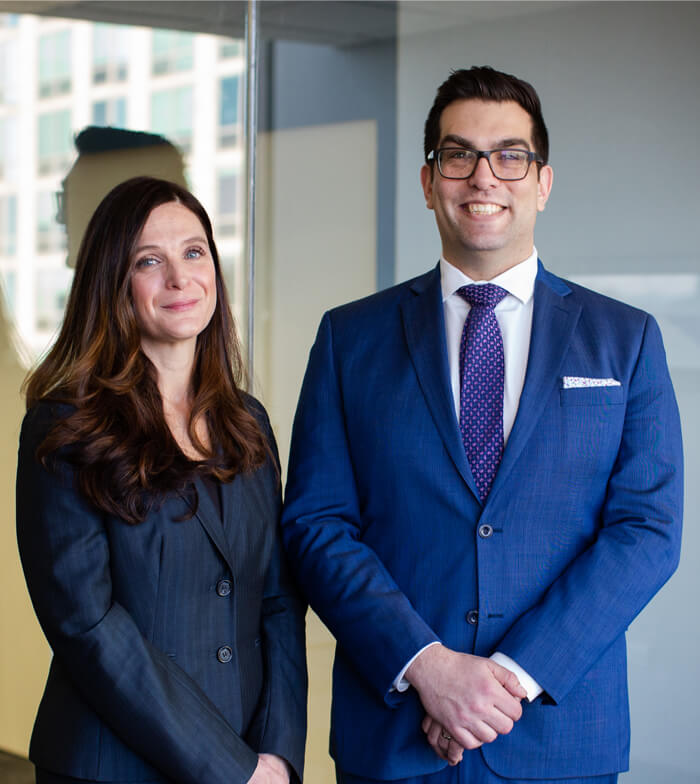Collaborative Law
If you’re seeking to keep decision-making during a divorce within your family, rather than leaving it up to the courts, Stern Perkoski Mendez offers collaborative divorce services as a productive solution in Evanston, Chicago, Lake Forest, Oak Brook and the surrounding suburbs.
Collaborative law is a non-litigation process in which both parties and their chosen professionals—including attorneys, divorce coaches and financial professionals—enter into a written agreement to focus all efforts, energies and resources on reaching an agreed-upon settlement before it goes in front of a judge.
Led by partner Nancy Stingle Perkoski, this method allows both parties to negotiate the terms of their parental or financial settlements without litigation in a court system. Nancy has more than 20 years’ experience practicing results-oriented, cost-effective family law and mediation. She is committed to guiding her clients through every step of this process and will be on your side until you finalize your divorce through the collaborative process.
What is collaborative law, and how does it differ from mediation?
In mediation, parties reach a decision about their divorce that is facilitated by a neutral, non-advising third party, called a mediator. In a collaborative divorce, parties work with a number of professionals—including divorce attorneys, divorce coaches, financial planners and sometimes child specialists—to reach a decision about their divorce.
In collaborative law, lawyers act as advocates, legal advisors, negotiators, drafters and consultants. A collaborative divorce allows you to obtain a divorce settlement without the need for contentious or lengthy litigation in court.
What are the benefits of collaborative law?
At Stern Perkoski Mendez, the process of collaborative law allows our clients:
- More Control. Collaborative law gives you more control over a highly personal and sensitive process and its outcome, instead of allowing a judge who may not know the specifics of your family
- Mutual Respect. All parties commit to maintaining civility and mutual respect throughout every stage of the process.
- No Litigation. Parties must also sign a Participation Agreement ahead of time, which promises they will not pursue litigation in court.
- Considerate of Children. As children suffer most from drawn-out or contentious divorce processes, one of the main goals of a collaborative divorce is to ensure that any children receive primary focus, and that their interests are protected by professionals like child advocates or specialists.
- Thorough Process. As all parties must commit to full transparency and confidentiality, the resulting settlement will encompass all issues including child support, spousal maintenance (alimony), life insurance, health insurance, parenting time, rules of conduct for parenting, choice of school, divisions of assets, allocation of debt and attorney’s fees.
What happens during collaborative law?
If you decide that a collaborative divorce is the right solution for your family, the first step is for both parties to hire qualified divorce attorneys, trained in collaborative law. Each party will then sign a mutual Participation Agreement, which means you will refrain from litigating the issues in court and will resolve all differences prior to filing the divorce action.
The next step is to build your collaborative divorce team. In a series of private meetings taking place outside the court, both parties will work with their respective attorneys and other professionals to reach a settlement together. These professionals can include divorce coaches, financial planners, mediators and child advocates as described below. All parties will share information openly, under a condition of confidentiality, to identify, address and resolve any issues. The team will put the agreed-upon settlement in writing.
After this agreement is reached, the settlement documents must be signed by both parties and their respective attorneys. Then one party will file the necessary papers with the clerk of court and set a date for a judge to approve it.
Who is involved in a collaborative law process?
A collaborative law process through Stern Perkoski Mendez typically includes the following professionals:
- Your divorce lawyer will act as your advocate, working on your behalf to reach a settlement that works for you and your future.
- An optional divorce coach for each party helps navigate the complexities of divorce by providing educational counsel and emotional support.
- Financial planners may be hired to help navigate complex financial issues, such as divided retirement accounts or stock options. They can also calculate child support, maintenance (spousal support), or set the terms for the sale of the marital residence.
- A child specialist can assist in the development of a workable parenting schedule and routine that accommodates a family in transition.
Contact Our Collaborative Law Firm in Evanston, Chicago, Lake Forest and Oak Brook
For a divorce in Illinois, Stern Perkoski Mendez can help you decide if collaborative law is the right course of action for your case. We are also happy to offer recommendations for divorce coaches, financial planners or child advocates should your case require them.
Request a free consultation online or call us at (847) 868-9584. We can meet with you in our offices in Evanston, Chicago, Lake Forest and Oak Brook or at another location.

